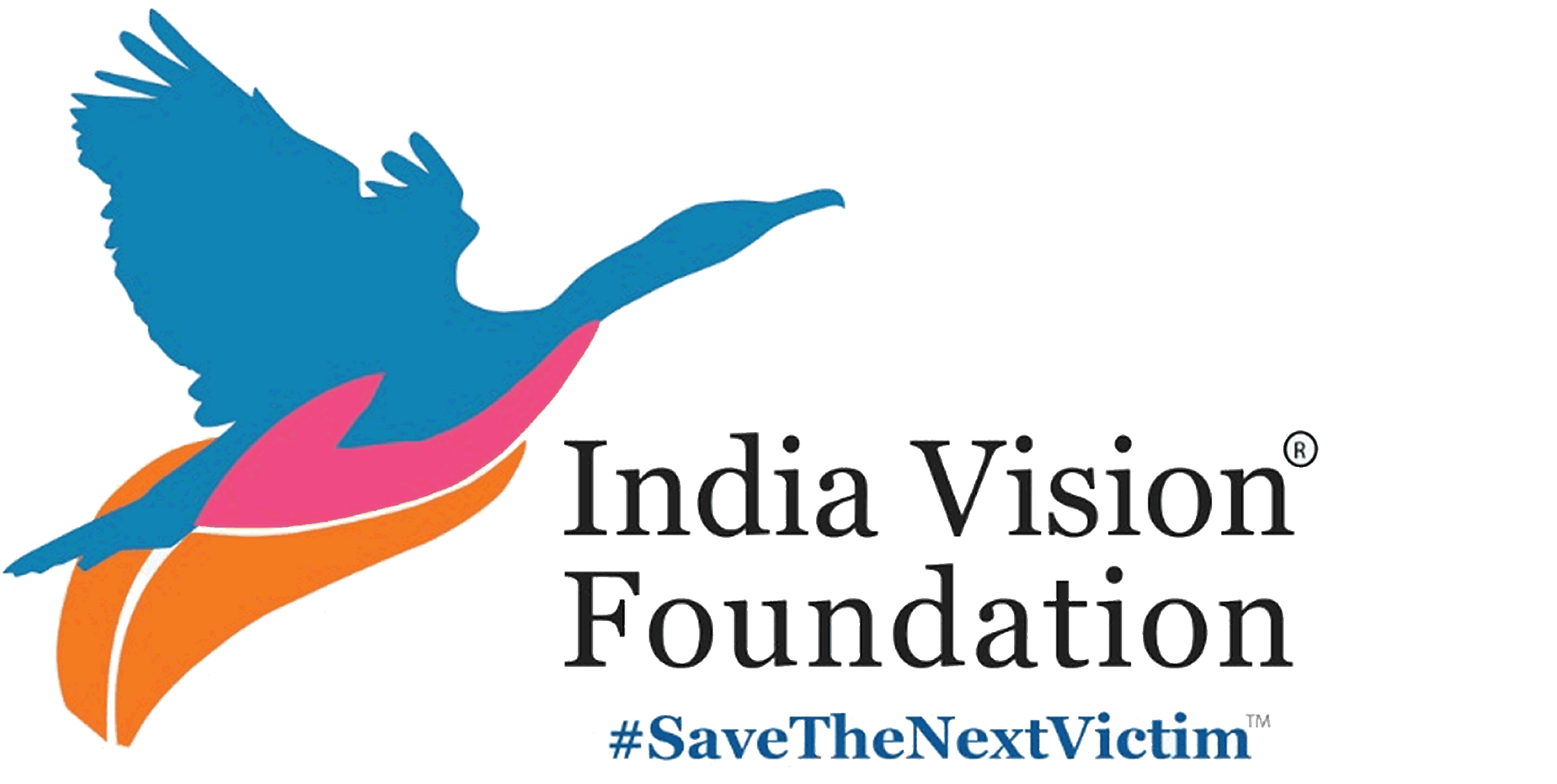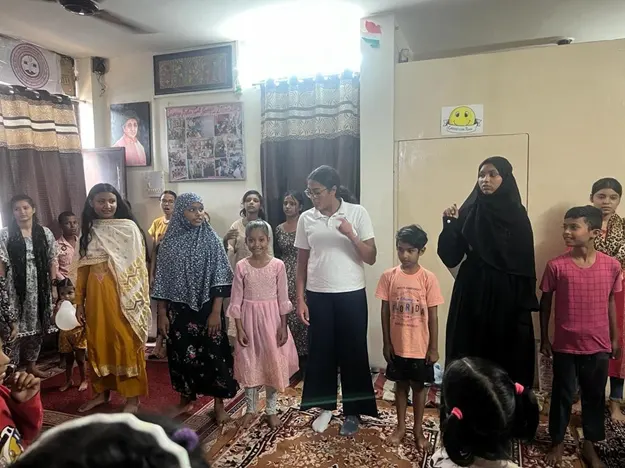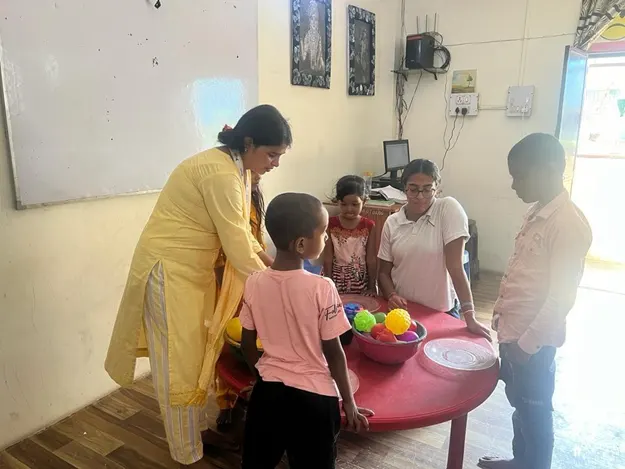What is Children of Vulnerable Families?
Children of Vulnerable Families is a program within the India Vision Foundation. It was started in 1994 by Dr. Kiran Bedi. Currently, there are 300 kids in this program, and they are looked after by four members of the Foundation. These children are the most vulnerable and are the ones that need support the most. CVF reduces the strain of financial issues, helps the children create a social network, reduces their vulnerability, develops responsible children, and gives children a formal education.
Who are the children?
All the children I met today are part of the Children of Vulnerable Families program, but they live with their families. Their mothers have been released from jail, and now they live in a community center called Bawana, which the India Vision Foundation started. Some children have been with this program for the last ten years. They joined CVF when their mothers were in jail and still receive support even after their mothers were released.
My objective of visiting these children in Bawana?
My objective is to visit the children in Bawana to interact and create a relationship; I have had the same purpose since the beginning. But the only thing different here is that they lived in a community. I started and want to continue building relationships with this COMMUNITY in Bawana.
What was my experience at Bawana?
When we got to Bawana, we went to the activities room. It was an ample space with a whiteboard, computer, rugs, and closet for supplies. The children were not in uniform. There were around 30 kids in the room at the time, ranging up to 11th grade. Some of the kids were shy, and some were very confident. Girls go to school in the morning, and boys go in the
afternoon, so there were more girls than boys when I was there. During this week, they are getting ready for the final exams. Right as we walked, all the children noticed Mrs. Monica right away. They were all very excited and happy to see her. Then I introduced myself, and they said, “Hello, Meera Didi!” I gave the teachers the goodies I had brought them, and then we set up to play our first game. For this game, we had to throw a balloon in the air and then collect as many blocks from the bowl into our plate without letting the balloon touch the ground. We only played one round because nobody was enjoying it. Then we all sat on the floor and played a giant game of telephone. Sumit, an 11th grade student, started the game. Everyone whispered to the next person what they had heard from the previous person, and the goal was to keep the phrase the same the whole time, but for this round, it did not. Then we played a second time, and Sangeena, an 11th-grade student, started it. Again, the phrase changed, and it was not the phrase we started with. After this, we played the pillow game, similar to a game in America called Hot Potato and musical chairs. Music played, and you passed the pillow around until the music stopped.
Whoever had the pillow in their hand when the music stopped had to dance or sing for everyone. The first to go was Farah, who performed a rap song. Then it was me. I am not a very good dancer or singer, so I just did this dance that helps little children remember the months of the year. Then this little girl went. I didn’t catch her name because she was quiet, but she danced to an Indian song. Another little boy spoke a poem, another girl sang, and some were shy they didn’t perform anything. Once we had finished telephone game, the teachers wanted me to show the little kids the dance and song to remember the months of the year. Afterward, we took pictures, and the little kids left. Then there were like 20-25 kids left, and we got in a big circle, and I asked them some basic questions like what’s your name and grade, what’s your favorite and least favorite subject. Many did not like mathematics or Sanskrit, what’s your favorite sport/game, etc. Many kids said their favorite game was GoGo, but I had never heard of it. I told them, so they decided to teach me, and we played it. After we wrapped up the game, 10-15 boys and girls tried to teach me Hindi. They taught me some basic phrases and how to say them with the proper accent. They taught me how to say: my name is…, my mom’s name is…, my dad’s name is…, my sister’s name is…, my favorite food to eat is…, I am from…, I live in, just the basic stuff. Then it was time for us to go, they gave me many drawings and cards, they asked me when I was going to come again, and I told them as soon as I could. One of the little girls approached me and said in Hindi, “I had so much fun. I will miss you.” She was so cute, and I told her I would miss you too. I said goodbye to as many as possible, and then we left the room. Once we got to the car, some kids from the balcony at the top were saying bye.
How did I feel during this experience?
I was pleased to see the children so lively and energetic. I could see the love they all had for each other. The older kids loved caring for and helping the younger children, and the younger children loved it when the older kids played with them. It indeed was a community. I felt very comfortable around all of them. They treated me as if they had known me all my life. Once we had finished telephone game, the teachers wanted me to show the little kids the dance and song to remember the months of the year. They were willing to learn and perform it for the class. When they gave me and Mrs. Monia cards and little gifts, I didn’t realize how much they loved interacting with others. I didn’t think this was what Bawana would be like at all.
What would happen if there was not a community like Bawana?
If there was no place like Bawana, the most vulnerable children would have difficulty getting through their difficult situations alone. They would not have anyone who could understand their situation, have a hard time making relationships and creating a social network, and probably not be able to express their true selves. Because of Bawana, they can all rely on each other because they have been in the same boat. They do not have to pretend certain events didn’t happen because everyone there has had a similar experience, and they are allowed to express themselves because everyone there can understand their situation.
About the author- Meera Jhulka is a 4.41 GPA holder (top 2% in USA),
Member of National Honor Society. Honor classes since her freshmen year. She is also a varsity Swimmer and Golfer and 4 times state qualifier.


